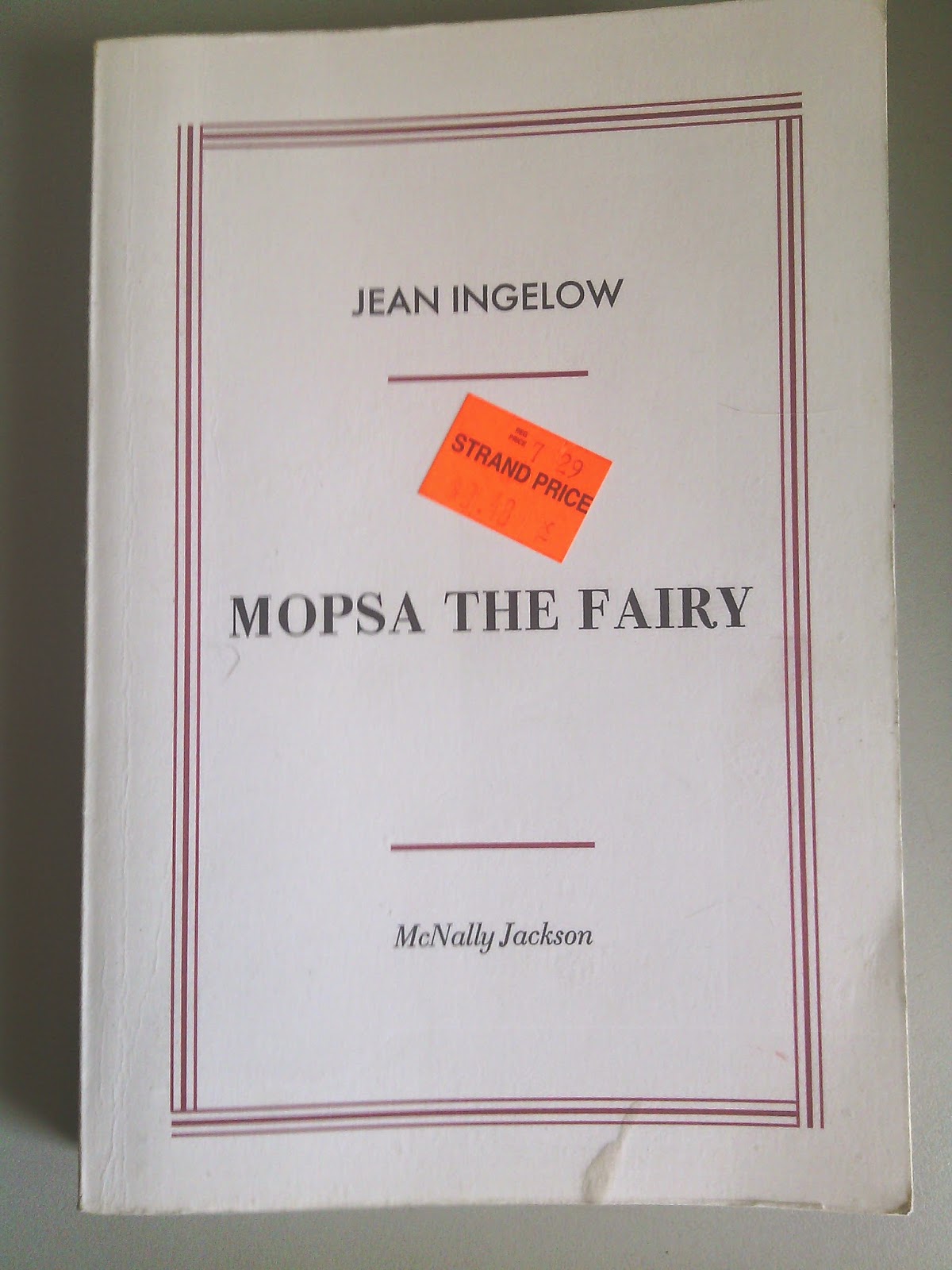I found this book on the street 2 weeks ago in someone's recycling, and I had never read it as a kid in school, which is where I imagine most people would have read this title. A very quick, enjoyable read, I was particularly moved by what a self-serving asshole the girl's true father turned out to be. I was equally impressed with the very "human" portrayal of his second wife. Of course, the title character's transformation from a money-obsessed miser to the bastion of fatherhood created the foundation for this story of multiple personal transformations. In the end, even Godfrey, the real father of Eppie, experienced some kind of growth via his character arc -- though I would have liked him to have gotten his just comeuppance more than what the author wrote for him.
27. Mopsa The Fairy by Jean Ingelow
What a cute kid's story!
I read this one for two reasons: 1. because the copy I have is a scan of the original 1969 London edition, complete with charming illustrations -- and everyone knows how much fun it is to read a book with pictures; and 2. the edition I have is some kind of print on demand Google Books edition, printed on really high quality paper and making for a really sturdy and comfortable read (the feel of the paper and indeed, the entire book in my hands during the reading experience). I am going to have to try to find more out of print Google Books print on demand mass market paperbacks like this to read -- though I wouldn't even begin to know where to look, and I am going to have to keep this copy because I can't sell it on Amazon because there is no listing category for this edition and there really is no point in creating one...
From Wikipedia:
[Author Jean] Ingelow's children's stories were influenced by Lewis Carroll and George MacDonald.[1] Mopsa the Fairy...[is] about a boy who discovers a nest of fairies and discovers a fairyland while riding on the back of an albatross)...
28. The Problems of Philosophy by Bertrand Russell
Everything really DOES go back to that fundamental question of "A PRIORIness," doesn't it? How much of life is experienced in light of very basic assumptions that we need to make in order to experience anything in the first place -- like:
- I will assume that I am alive and that this means something.
- I will assume that I have some power of thought and contemplation and understanding, and that there is at the root of this power some basic truth stating that what I see and feel actually IS what IS -- in other words, that I and others before me am experiencing and have experienced the world as it really IS -- not some perversion of that world.
- I suppose we need to assume that there is indeed "a world" in the first place for us to observe and make judgments about -- if we can believe that our judgments have any validity (and, more basically, if we can assume that we exist in the first place to make these observations and judgments).
- and the logic of this goes on and on, descending deeper and deeper along a spiral staircase into a netherworld of despair where everything can be questioned and nothing is certain...
29. Principles of NLP by Joseph O'Connor & Ian McDermott
I became interested in learning about Neuro-Linguistic Programming as a branch of psychology after reading The Game by Neil Strauss several years ago. The idea that by mirroring a woman's body language, or by subtly insulting her in just the right way at just the right time and intervals, I could make her fall madly in lust with me was just too much for my libido to allow me to pass up the opportunity to purchase this brief overview of the field when I saw it on an outside rack at The Strand in Union Square last year.
I have to say that after making my way through this relatively dry book, I have thoroughly satisfied my need to know about NLP and will probably never need to read anything else on the subject going forward. Not because it was so horrible or boring or anything like that, but simply because by its nature, NLP seems to think about the functioning of the human mind in a way that doesn't really resonate with what I care about or how I want to approach my life or finding solutions to my particular life "problems."
I recognize that for many, NLP might be the way to go. For me, it was a whole lot of thinking in a direction that makes things a bit more complicated than they need to be. At times, I felt that I was reading about "jargon ideas" rather than about life as it actually unfolds on a day-to-day basis in most personal and interpersonal experiences.
Still, if you like NLP, this is a good introduction to the subject.




No comments:
Post a Comment
If you leave me a spam comment, it will immediately be removed. I will never EVER leave your comment in place on my blog. It will be permanently deleted in minutes.
Note: Only a member of this blog may post a comment.